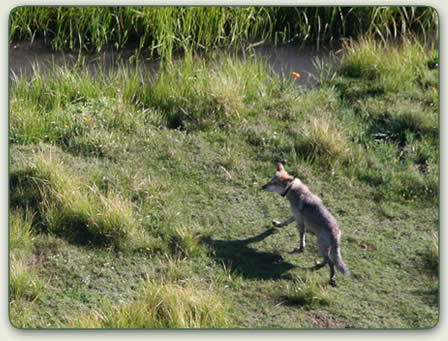14
Dec
Press Release: Mexican Wolf and Wolverine Named to 2017 List of Most Imperiled Species
 FOR IMMEDIATE RELEASE
FOR IMMEDIATE RELEASEMedia Contacts:
Jessica Walz Schafer
jessica@wildlandsnetwork.org
503-467-8007
jessica@wildlandsnetwork.org
503-467-8007
Kim Crumbo
crumbo@wildlandsnetwork.org
928-606-5850
crumbo@wildlandsnetwork.org
928-606-5850
Mexican Wolf and Wolverine Named to 2017 List of Most Imperiled Species
SEATTLE, WA (Dec. 14, 2017) — In the face of increasing threats to native wildlife and the Endangered Species Act (ESA)—one of America’s bedrock conservation laws—the Washington, D.C.-based Endangered Species Coalition today released their annual report highlighting the “Top 10” species at-risk of extinction in the U.S.
The report, Suppressed: How Politics Drowned out Science for Ten Endangered Species, shines a spotlight on two species identified by Wildlands Network as animals requiring large, interconnected landscapes across state and international boundaries to survive: Mexican wolves and wolverines. Both species are known to travel hundreds of miles looking for food, habitat, and potential mates, and are vulnerable to human-caused habitat fragmentation, human disturbance, and climate change.
“Wildlands Network has been working to protect the Mexican wolf, the most endangered subspecies of gray wolf in the world, for decades,” said Kim Crumbo, Conservation Director for Wildlands Network. “Unfortunately, the Mexican wolf recovery plan being crafted by the U.S. Fish and Wildlife Service (FWS) has thus far failed to include the components necessary to ensure recovery in the U.S., leading to today’s acknowledgment of the precarious status of this keystone species.”
Wildlands Network has been a vocal critic of some of the FWS’s political decisions pertaining to Mexican wolves and wolverines. In addition to concerns about the FWS’s current plan to delist the Mexican wolf under the ESA if the population reaches 320 individuals—less than half the number recommended by independent scientists—Wildlands Network and other experts have also challenged the FWS’s proposed limitations on Mexican wolf habitat and the research that has supported those limitations.
Meanwhile, in 2013, the FWS proposed to list the wolverine as threatened under the ESA, stating that wolverine populations in the contiguous U.S. would likely be negatively affected by habitat loss due to climate change. The FWS withdrew the proposed listing in 2014, but the federal district court for Montana then overturned their withdrawal —having determined that the FWS ignored the best available science and violated the ESA. The successful lawsuit was filed by a broad coalition of conservation organizations, including Wildlands Network.
“While the listing decision continues to work its way through the court system, Wildlands Network is spearheading on-the-ground efforts to allow wolverines freedom to roam, and also to protect areas necessary for their survival in a warming climate,” said Jessica Walz Schafer, Pacific Wildway Director for Wildlands Network. “Wolverines recolonizing the Cascade Range exemplify the need for regional connectivity here in the West. As our climate continues to warm, wolverines may be one of the first species to be isolated within smaller and smaller habitat islands. “
Wildlands Network hopes this report will raise public awareness of the plight of these two iconic native species, whose respective fates lie in the hands of federal and state decision-makers accountable to the American people.
#####
Wildlands Network envisions a world where nature is unbroken, and where humans co-exist in harmony with the land and its wild inhabitants. Our mission is to reconnect, restore, and rewild North America so life in all its diversity can thrive.
~~~~~~~~~~~~~~~
“Suppressed: How Politics Drowned out Science for Ten Endangered Species” highlights ten imperiled fish, plant and wildlife conservation decisions over the last decade in which the science was either ignored or suppressed as a result of intense special interest lobbying and influence. Mexican wolves are featured on page 4 of this report.



